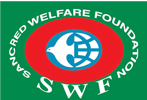At a glance of SWF
BACKGROUND
SWF has gradually been stepping forward with trained, experienced and committed work-force who are, always devoted to give their best efforts in implementation of program activities very effectively. It has been extending its operational branches, staffs and beneficiaries countrywide through expansion of microfinance program. At present, it has been expanding its working areas in different part of the country.
Alongside, it has been promoting a better lifestyle of the under privileged people through implementation of health, agriculture, gender, human rights, livelihood, empowerment, social business, agro-forestry, sustainable access to agro-forestry knowledge, transferring of technology and information, and emergency relief and rehabilitation program.
OUR VISION
MISSION
GOAL
CORE VALUES

LEGAL IDENTITY
| Sl. # | Registration Body | Registration no. | Date |
| (a) | Joint Stock Companies & Firms | S-5068(181)/05 | 30/08/2005 |
| (b) | NGO Affairs Bureau of Bangladesh | 2171 | 04/12/2006 |
| (c) |
Micro-credit Regulatory Authority under MRA Act 2006 (rule no. 32 of 2006) of rule 16 of sub-rule (3) |
00315-02052-00054 MRA: 0000054 |
05/09/2007 |
|
(d)
|
Directorate General of Health Services: Sancred community health service center & hospital Sancred Diagnostic Center |
HSM 4311053 HSM 4512866 |
09/10/2019 03/10/2019 |
| (e) |
Nursing Council and Midwifery (Community Paramedic Training Institute) |
BNC/2013/451
|
19/6/2013
|
APPROACHES AND STRATEGIES
- Participatory Approach
- Integration Approach
- Knowledge and Learning Sharing Approach
- Accountability and Transparency
- People Centered Approach
- Networking and Collaboration Approach
- Needs-driven Approach
- Rights based Approach
PROGRAM SUPPORT UNITS AND HUMAN RESOURCES
Program Support Units
- Finance & Accounts Unit
- Admin & HR Unit
- Internal Audit & Monitoring Unit
- Planning, Research & Evaluation Unit
- Information & Communication Unit
- Risk Assessment & Management Unit
Human Resources (Manpower)
| Regular Staffs | ||||||
| Gender | Permanent Staffs | Project Staff | Total | |||
| Male | 123 | 11 | 134 | |||
| Female | 21 | 04 | 25 | |||
| Paid Community volunteers and Teachers: | ||||||
| Gender | Permanent Staffs | Project Staff | Total | |||
| Male | – | 265 | 265 | |||
| Female | – | 365 | 365 | |||
FINANCE & ACCOUNTS SECTION
This section mainly maintains the central accounts of Sancred Welfare Foundation (SWF), dealing with overall fund inflows & outflows, utilization of fund, fund management and investments. The accounts also coordinate the program and project based accounts. It also monitor the transactions are adequate with the SWF Accounts Manuals. The procurement, store and stock management, logistic management, construction work, safety and security measures are the main responsibility of this section. Accounts section not only deals with all financial policy issues, but also participates in relevant program related work and contributes to the policy-making process of the organization.
COMMUNICATION, INFORMATION & DOCUMENTATION SECTION
►Newsletter (quarterly)
►Yearly Diary, Greetings Card, Calendar
►Poster, Leaflet, Sticker
►Case study
Sancred Welfare Foundation (SWF) has conducted various researches. During the year, it has conducted a study in Juriupazila of Moulvibazar district for assessing the health situation of the upazila. The findings of the study were shared with donor agencies in Sylhet. Another study has been conducted in Khagrachhari district to assess the socio-economic situation of the indigenous people of the district which also included overall health issues in the survey format. Other studies of SWF include: Livelihood Study on Hajong and Garo (indigenous group) People in Bangladesh 2006, Baseline Survey of Integrated Community Development Project 2008, Study on Cancer Hospital, Baseline Study on Disable People in Mymensingh and Netrokona districts etc. Sancred Welfare Foundation (SWF) has also conducted another base line survey in Khagrachhari district with the objects to assess the socio economic situation of the indigenous community of the district. Another study is conducted at Juriupazila of Moulvibazar district to find the health situation of the community people. The findings and experience of the study are tremendous.
MIS & AUDIT SECTION
The monitoring & internal audit cell is independent for their works. It carries out routine internal audit, investigation, physical inventory and other assignments to maintain organizational transparency and accountability. Internal Audit highlights the credibility of all financial transactions and safeguards of assets. SWF has an adequate accounting and internal control systems. The internal auditing has assigned specific responsibilities by management for reviewing these systems, monitoring their operation and recommending improvements thereto. This may include review of the means used to identify measure, classify and report such information and specific inquiry into individual items including detailed testing of transactions, balances and procedures. Also review the economy, efficiency and effectiveness of operations including non-financial controls of SWF. Review of compliance with laws, regulation and other external requirements and with management policies and directives and other internal requirements. The Internal Audit Cell also works for; confirm that liability has been incurred only in respect of the legitimate operations of the organization, prevention and early detection of fraud and undertake special investigations at the request of management.
